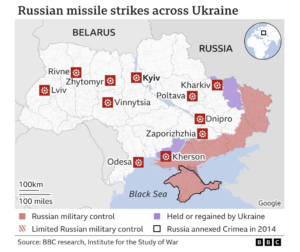Clark Forum: Paradigm Lost
April 30, 2023
By attending the Clark Forum Paradigm Lost, I gained a much better understanding of the history of the land currently contested by Israelis and Palestinians, and the conflict between the two groups. The full historical analysis helped me understand the reasons for the conflict today, and how world events such as World War Two affected the region. Through Professor Lustick’s careful explanation of the issues at hand and the ways that governments have approached the resolution of the problems, I was able to understand his argument. His solution argued that Israel will never be divided into two states, and what is required is a more in-depth solution emphasizing equal rights.
One concept he mentioned that I could relate to class was the U.S. role in the Oslo Accords. Professor Lustick described how complex the conversations were, using maps to further his point. It helped me understand visually why he believes in a one-state solution. I was also able to connect the lecture with broader topics we have discussed like countries’ and the UN’s role in fostering diplomatic talks. However, he notes a cyclical pattern of violence and unsuccessful negotiations. In addition, I connected our previous discussions on the aftermath of the World Wars and colonialism to the events occurring in Israel today.
With limited knowledge on the issues, and having heard only his perspective, I can say I found the latter part of his argument persuasive. However, I am not knowledgeable enough on the topic to understand possible counterarguments, or raise any disagreements. His description of a seemingly never-ending timeline in which the two-state solution will no longer be viable was effective as a learner to understand the sorts of debates revolving around the issue. Therefore, Professor Lustick not only had a persuasive argument, he was also able to explain a deeply complex issue to attendees who might have little knowledge on the conflict.
Factors That Encourage SDG progress
April 30, 2023
Prompt:
How do national and international factors interact in empowering some states of the Global South to make more progress toward the UN Sustainable Development Goals than other states?
After completing our group project on Sri Lanka and participating in the Zoom meeting I gained better insight into national and international factors that empower states of the Global South to make more progress toward the UN Sustainable Development Goals. Factors related to SDGs often interact. For the purposes of this post domestic factors like transparent government and natural resources will interacts with international factors like trade, and states demonstrate varying levels of success.
While researching Sri Lanka I found that corruption significantly limited progress on sustainable development goals, because it created income inequality and poor economic policies. In the Zoom meeting, many other groups connected high corruption to poor SDG progress, such as in Bangladesh, which fails to achieve some of the fundamental purposes of government. By contrast, Singapore offers government programs that sponsor transparency. Their impressive progress on the SDGs can be primarily attributed to the successful implementation of goal 16, peace justice, and strong institutions. The importance of government transparency is crucial to making SDG progress from a foundational standpoint. The transparency in government and fund usage is especially important in managing industries that have the capability to produce economic growth.

https://toolkit.climate.gov/image/3477
One industry that governments interact with through policy and regulation is natural resources. Resources like petroleum in Turkey and fish in Sri Lanka provide work and income for citizens. However, petroleum in Turkey has been a significant export, allowing for growth in the face of economic crises like the pandemic. Whereas fisherman in Sri Lanka still have access to the natural resource, inflation makes fishing equipment so expensive that their is little economic growth for citizens. Industries based on natural resources can create consistent work opportunities, amongst other things, but strong institutions are required to ensure that such resources are managed in ways that promote the different aspects of goal eight. In addition to that, countries like Singapore, which need natural resources like fresh water, must maneuver international trade markets to ensure that they have access to such an important resource.
Trade has been a consistent factor in connecting domestic markets of countries to international factors. From natural resources like petroleum, lithium, and water to manufactured goods like textiles, trade bolsters the economy and growth in many of the countries. In addition, countries have to build strong relationships with other countries to maintain trade relations. Trade is a consistent factor that helps with the economic implementation of sustainable development goals. However, strong institutions are needed to ensure proper management of the resources, and what level of government intervention is needed in markets. Therefore, all of these factors closely interact, but countries must be strategic in management to ensure that growth occurs.
Clark Forum: War in Ukraine
April 22, 2023
The Clark Forum about Russia’s war in Ukraine introduced information that I would have struggled to understand from the news individually. It was helpful to hear each of the professors’ insights, specifically on international relations and the predictions some of the professors made about the upcoming months. Logistical problems such as training on weapons from other countries and the need for ammunition for specific guns helped me understand the multiple factors that impact each aspect of the war. That, paired with the possibility of waning political, economic, and military support in the West for the war has the potential to create challenges for Ukraine. It reminds me of recent class discussions on the domestic influences on US involvement in international conflicts.

https://www.bbc.com/news/world-europe-60506682
One aspect of the presentation I found very interesting was the noting of the EU as a shifting institution, which is now providing military aid to Ukraine. We have spoken in the past about institutions shifting over time or in response to world events, such as the growing institutional effectiveness in the post-Cold War world. Nevertheless, learning about a current example illustrated how institutions must change in response to the world around them and that they are not stagnant entities. In addition to that, I found the section on economic sanctions and their historically low success rates very informative. After the onset of the war, I remember economic sanctions as one of the most discussed topics on the news, but hearing that they have low rates of success was new to me, and changed the way I think about support from the US in response to the conflict.
Overall, I found the lecture very informative but would have liked to hear more specifically about institutions, and how they might continue to play a role in the conflict.